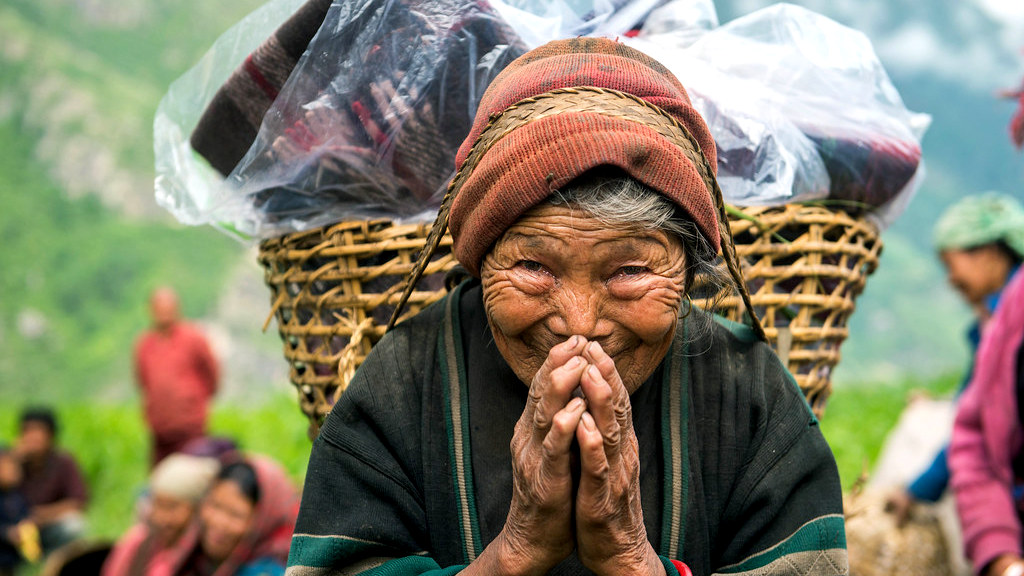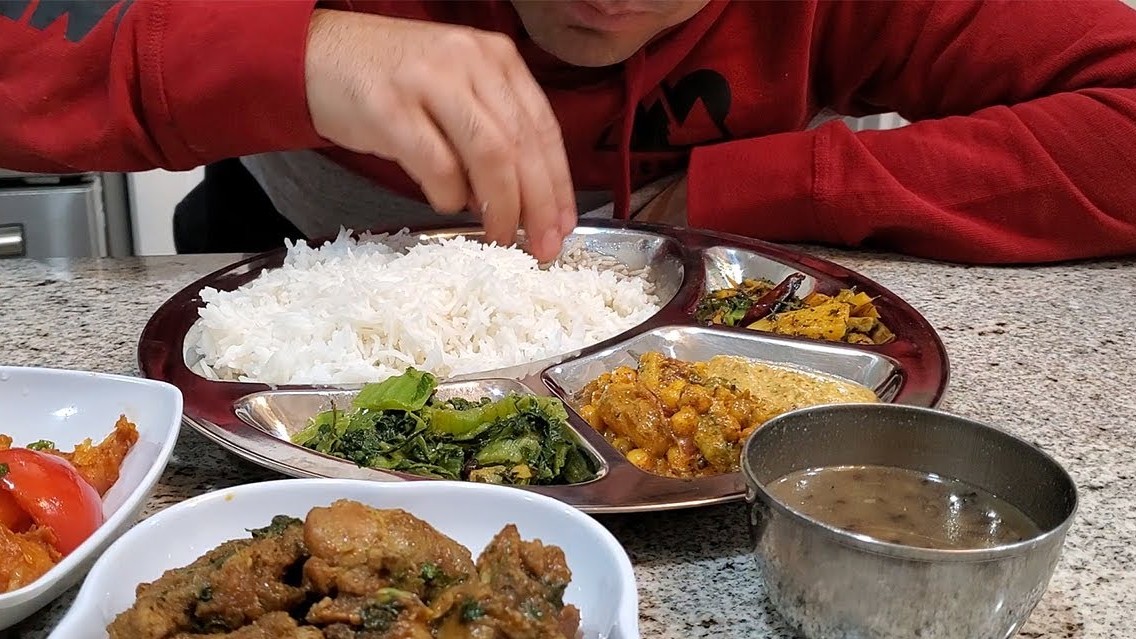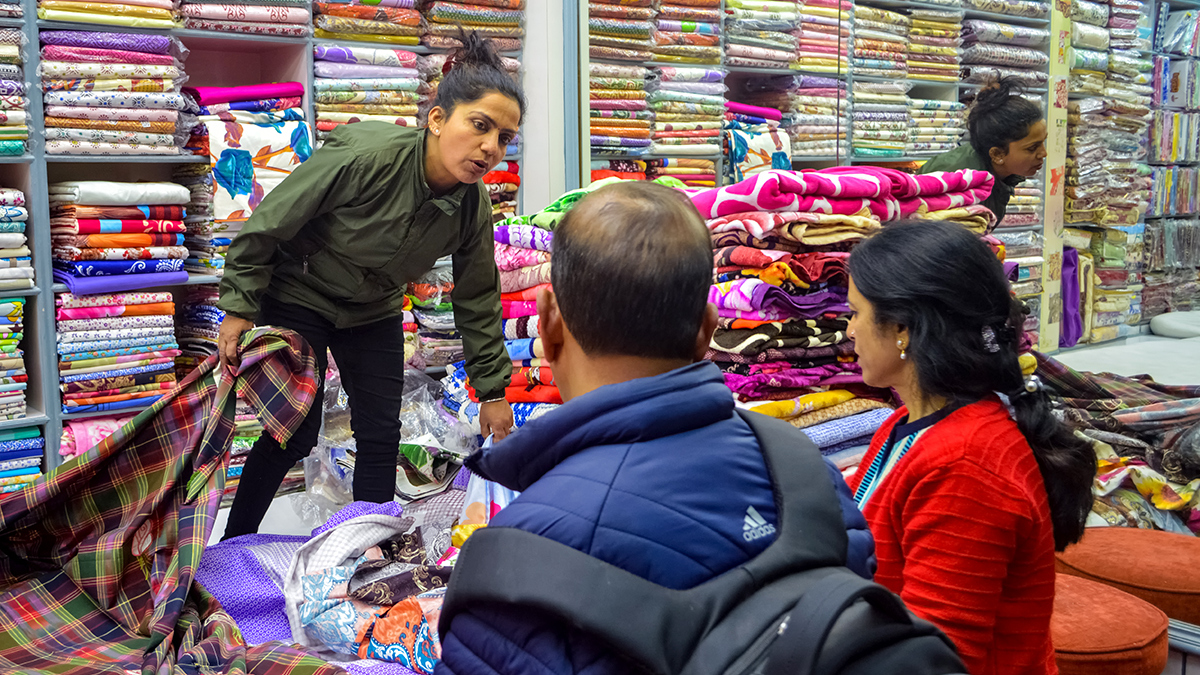Nepal, renowned for its majestic Himalayas and rich cultural tapestry, offers travelers an experience like no other. If you're planning a visit, it's essential to familiarize yourself with some cultural norms to ensure a respectful and pleasant journey. Here are some cultural tips to consider:
Greetings
In the heart of the Himalayas, Nepal has a rich tapestry of traditions and customs, and one of the most recognizable is its traditional greeting, "Namaste" (pronounced nuh-MUS-tay). Translating to "I bow to you," this greeting goes beyond mere words and delves into the essence of respect and spiritual acknowledgment. When Nepalis say "Namaste," they usually accompany it with a slight bow and with their hands pressed together in front of their chest in a prayer-like gesture. This specific hand gesture has its own name and significance; it's called the "Anjali Mudra." Rooted deeply in both cultural and spiritual practices, it symbolizes honor, courtesy, and the recognizing of the divine spark within every individual. Whether you're meeting someone for the first time or saying goodbye, "Namaste" and the accompanying "Anjali Mudra" remain an integral part of Nepali etiquette, reflecting the nation's deep-rooted values of hospitality and reverence.

Dress modestly
When visiting Nepal, both men and women should be mindful to dress modestly. This includes clothing that covers the shoulders and knees, while also avoiding attire that is overly revealing or tight-fitting. Embracing the local culture by donning traditional Nepali clothing is a wonderful way to show respect and appreciation for the country's rich heritage. For men, this could mean wearing the "kurta suruwal," a traditional set of garments, while women might opt for a "kurta" or a "sari." While it's not mandatory to wear these traditional outfits, doing so can enhance your cultural experience and help you connect more deeply with the local population.
Shoes
In Nepal, footwear plays not just a functional role but also holds cultural significance. When visiting temples, monasteries, or stepping into someone's home, it is customary to remove your shoes. Wearing shoes indoors in such places is viewed as disrespectful. This act of taking off one's shoes symbolizes leaving the impurities of the outside world at the doorstep and entering a sacred or personal space with purity and humility. Always ensure to observe this simple yet profound etiquette to show your respect and appreciation for Nepali traditions.
Respect religious customs
Nepal is a melting pot of spiritual traditions, with Hinduism and Buddhism being the predominant religions. The landscape is dotted with ancient temples, majestic stupas, and serene shrines, all of which command deep reverence. When navigating these sacred spaces, it's imperative to be mindful and respectful. Refrain from touching religious artifacts unless it's explicitly allowed, and always maintain a decorous demeanor. Photography can capture the beauty of these sites, but it's essential never to take photos of people worshipping without first seeking their permission. Respecting these customs is not just about following local etiquette but also about appreciating the deep spiritual significance these places hold for the Nepali people.
Public affection
While the Nepali people are known for their warmth and hospitality, there are certain cultural norms around expressions of intimacy in public. In Nepal, public displays of affection, such as hugging, kissing, or even holding hands, are often viewed with reservation and can be considered inappropriate, especially in rural areas or in the vicinity of religious sites. It's essential to be mindful of these cultural sensitivities to ensure a respectful interaction with the locals. By adhering to these norms, visitors can foster an atmosphere of mutual respect and understanding, ensuring a harmonious experience during their stay.
Eating etiquette
Navigating the dining traditions of Nepal can offer a unique insight into its rich cultural fabric. When it comes to eating, there are a few key etiquettes to keep in mind:
-
Right Hand Rule: In Nepal, the right hand is traditionally used for eating, as the left hand is often perceived as unclean. Whether you're reaching for a dish or consuming your meal, always opt for the right hand.
-
Two-Handed Offering: If you are presented with food or drink, it's a gracious gesture to accept it with both hands. This act signifies deep appreciation and respect for the host's hospitality.
-
Portion Sizes: When served a meal, especially in someone's home, it's considered polite to take a small portion initially. If you find yourself still hungry, you can always ask for more. This practice showcases moderation and ensures that no food goes to waste.

Remember, embracing these dining etiquettes is not just about adhering to local customs; it also deepens your immersion into the Nepali way of life, fostering a sense of connection and mutual respect.
Gifts
The act of gift-giving in Nepal is a cherished tradition, symbolizing gratitude and warmth towards the host. If you find yourself invited to a Nepali household, it's a thoughtful gesture to bring along a small gift. Common and appreciated gifts include fruit or sweets, which are seen as tokens of goodwill. When offering or receiving a gift, always use both hands. This dual-handed gesture is emblematic of respect and wholeheartedness in the exchange.
Personal space
Interpersonal distances and notions of personal space in Nepal may vary from what one might be accustomed to in Western nations. In conversations and social interactions, Nepali individuals might stand closer to each other, reflecting their warmth and sense of community. However, while this closeness is part of the culture, it's crucial to exercise caution when it comes to physical contact, particularly with individuals of the opposite gender. Unwarranted or unexpected touching can be seen as inappropriate or disrespectful. By understanding and respecting these nuances, visitors can navigate social situations more gracefully, ensuring harmonious interactions with the locals.
Gender roles
Nepal, with its rich cultural mosaic, has deep-rooted traditions and customs that often shape perceptions and expectations around gender roles. Especially in rural areas, these roles can be more pronounced, with men and women often having distinct responsibilities and duties within the household and community. Men might be seen taking on roles that involve heavy labor or decision-making, while women often handle household chores, child-rearing, and farming tasks. As a visitor, it's essential to recognize and be respectful of these traditional norms. While urban areas might exhibit a more progressive shift in gender dynamics, acting with sensitivity and understanding in both urban and rural settings will ensure that one's interactions remain respectful and harmonious.
Bargaining
When exploring the bustling markets and vibrant souvenir shops of Nepal, you'll quickly notice that bargaining is not just accepted but often expected. This age-old practice is embedded in the local shopping culture and can add an element of fun to your purchasing experience. However, it's important to approach bargaining with a polite and friendly demeanor, understanding that the process is as much about cultural exchange as it is about financial transactions. While negotiating a price, remember to be respectful and considerate, ensuring that the final agreed-upon price is fair to both you and the seller. Embracing the art of bargaining in this manner can enhance your cultural immersion and leave you with not just a purchased item but also a memorable interaction.

Being aware of and adhering to these cultural tips not only demonstrates your respect for Nepal's rich heritage and traditions but also deepens your connection with the local community. Every gesture of understanding and accommodation can bridge cultural gaps and foster mutual appreciation. As you journey through the diverse landscapes and engage with the warm-hearted Nepali people, your sensitivity to these customs will undoubtedly enhance the authenticity of your experiences. Nepal offers a tapestry of moments waiting to be woven into memories, and showing respect for the local customs ensures that these memories are both enriching and cherished.
Important Articles regarding traveling in Nepal
Introduction of Nepal
FOODS IN NEPAL
Before You Plan Nepal Trip
While You are in Nepal
Before Traveling Nepal
If you need any further information, please contact us, Email: [email protected], Phone: +977- 985 100 5129 (WhatsApp)




